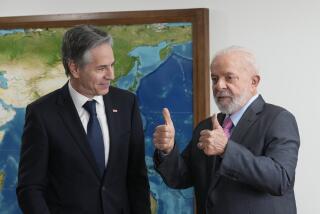Brazil Wants New Loans, Not Outside Pressures
- Share via
BRASILIA, Brazil — Finance Minister Dilson Funaro says it is time for Brazil’s creditors to resume lending and investing here instead of trying to impose anti-inflation measures that Brazil will not accept.
Funaro said in an interview that Brazil’s own anti-inflation program, which started Feb. 28 with monetary reform, has been a success. He said Brazil has achieved stable prices, increased employment and consumer sales at levels not seen here since 1980, before the debt crisis began.
“The banks can see that Brazil has made a great effort to normalize the situation,” he said. “It is up to them to do their part now.”
This was a reference to refinancing Brazil’s $104-billion foreign debt, but Funaro added that refinancing is not enough. He said Brazil will need at least $2 billion a year in new loans and additional foreign investment to achieve its growth goals.
“Brazil should not only make payments on its debt but should receive new loans as it pays; this is the normal way,” he said.
“If the international capital market doesn’t respond to Brazil’s performance, it will be clear that our effort was in vain, because we invested in something that does not exist. If that is the case, we will have to change our policy immediately.”
A hardening of Brazil’s debt position was signaled here June 10 with the announcement that Brazil had unilaterally established new rules for payment on its $7.4-billion debt to creditors such as the U.S. Export-Import Bank.
“We will pay interest and 15% of the principal over 15 years, with four years of grace,” Funaro said. He added that Brazil had set aside $1 billion for these payments in the current year and first half of 1987.
“If some creditor does not agree (with these terms), he can send back the check,” he said.
Brazil is $3 billion in arrears for interest and principal to the so-called Paris Club, a group of creditor governments formed for negotiations on Third World debts. Talks on long-term refinancing ended in stalemate because of the demand by creditors that Brazil enter into a formal agreement with the International Monetary Fund.
“We will not submit our economic decisions to the IMF. That’s definite,” Funaro said.
Since the debt crisis began in 1982 with Mexico’s suspension of debt payments, Brazil’s policy has been to keep up to date on interest owed to creditor banks but to roll over principal payments from year to year.
Neither Funaro, 52, an industrialist from Sao Paulo, nor President Jose Sarney, who put him in office last August, use the strident rhetoric of the political left on the debt issue. There is no talk here of stopping debt-service payments, a possibility that has been raised elsewhere in Latin America.
International banks have been reluctant to increase their loans in Latin America, but Funaro thinks that an exception should be made in the case of Brazil, in recognition of the country’s economic performance.
He said Brazil will increase production of goods and services this year by between 7% and 8%, for the second year in a row. This year, moreover, inflation has been halted. Prices, which rose 230% in 1985, have risen less than 1% since the monetary reform of Feb. 28.
The monetary reform was accompanied by a price freeze on about 80% of goods and services. With strong monitoring by government agencies, and consumers mobilized to denounce any price violations, the price freeze has worked. There have been supply problems that required adjustments--such as a subsidy to dairy farmers--but no serious shortages.
Demand for automobiles is so strong that there is a wait of up to three months for popular models. Supermarket sales are up 20%.
Because of strong growth last year and this year, Funaro said, Brazil’s internal budget deficit is being reduced--to an estimated 2.5% of its gross national product in 1986 from 5.1% in 1985.
Funaro and Minister of Planning Joao Sayad are tightening up control of budget execution, particularly by the big state enterprises that in Brazil control such key sectors as petroleum, electric power and steel.
Unlike most other Latin American debtor countries, Brazil has been able to expand exports while reactivating its internal market. Trade figures for the first five months of this year indicate that Brazil will have a 1986 surplus of more than $12 billion, repeating last year’s strong performance.
These surpluses have permitted Brazil to keep current with interest payments on its debt. Early in June, for example, Funaro authorized the payment of $1 billion in interest on debts to foreign governments. He said debt servicing would cost Brazil about $9 billion this year.
But Brazil has not been able to work out with its creditors--banks and government lenders--the kind of long-term refinancing that has been approved for Argentina, Mexico, Venezuela and Chile.
The problem is Brazil’s insistence on keeping a free hand in managing its economic policies. Negotiations on multiyear refinancing have been deadlocked by the insistence of the major creditor governments, led by the United States, that Brazil submit to policies designed by the IMF to discipline Third World economies.
Brazil has consistently rejected a formal agreement with the IMF that would be politically unpopular here.
“The way out of the debt crisis is through growth, and the IMF formulas don’t provide growth,” Funaro said.
More to Read
Sign up for Essential California
The most important California stories and recommendations in your inbox every morning.
You may occasionally receive promotional content from the Los Angeles Times.










